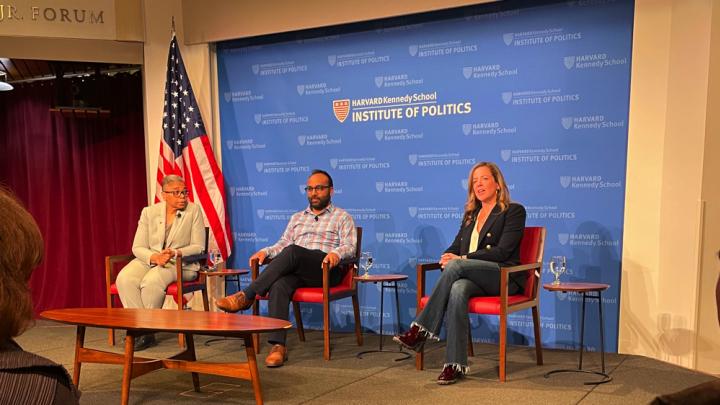History will look back on 2024 as the first AI election, said Shorenstein Center director Nancy Gibbs in her introduction to the event, “AI and its Implications for Democracy.” That sense of the historical moment pervaded the ensuing conversation among participants, who stressed the unprecedented nature of current technological progress.
Paul professor of the practice of government and technology Latanya Sweeney, who called the present moment a possible “third industrial revolution,” moderated as former White House official Miriam Vogel and professor of public policy Sharad Goel discussed how artificial intelligence will affect elections and politics.
Notwithstanding the importance of generative AI, the panelists repeatedly emphasized its nascency. Vogel noted that we may still be in the “first inning” of the technology.
Goel said it would be a mistake to assume that AI has reached its apex and that it’s much more likely that the technology will surpass any current expectations.
The capabilities of artificial intelligence, however, were a matter of continued disagreement between the panelists. While Vogel called the generative AI platform ChatGPT “a team of interns” that can provide a good first draft of a document, Goel argued the technology should be thought of as a team of experts, possibly even the best experts in the world.
And while Vogel expressed optimism that technology will allow us to distinguish between AI- and human-created content, Goel immediately disagreed, saying that generative AI will not only outpace verification but also that it will “dissolve” the boundary between content made by a human and machine.
What the panelists and Sweeney shared, though, was a common pessimism towards the consequences of such technology on democracy and elections. The speakers worried that deep-fake replications of politicians could spread misinformation instantly.
Sweeney also noted that campaigns could theoretically tailor misinformation to each voter to be maximally persuasive, even if the presented facts were false. False information could become so normalized, said Goel, that he worries people may “just give up” and distrust any source of information.
While Goel added that perhaps ChatGPT could be used to counteract such a trend by providing “real-time fact checking,” Sweeney pushed back on this capability, saying that generative AI consistently produces “vile” and “racist” statements. “What it thinks are facts,” she said, “are problematic.”
This pessimism wasn't confined to the subject of democracy. Vogel also noted the deleterious effects AI may have on inequality, saying that the “technology is continuing to create a deeper divide” between the haves and have-nots.
Goel went as far as to say that he would “shut it down” if he could, meaning he thinks the risks posed by such technology may outweigh the benefits. He and Vogel agreed, however, that there is no turning back now, since AI is irrevocably out in the world.
Still, there were moments of optimism. All the speakers acknowledged the tremendous upside potential of the technology for advancing science. Education, too, was repeatedly cited as a field that could be greatly improved through the use of artificial intelligence. The talk ended on a lighter note, as Vogel expressed this fundamental optimism, and compared the technology to great innovations of the past, such as the invention of airplanes and automobiles.







